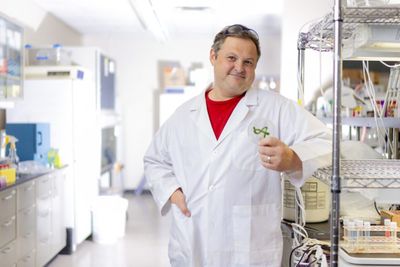Andrew Palmer, Ph.D.
Associate Professor | Ocean Engineering and Marine Sciences
- Melbourne FL UNITED STATES
- F.W. Olin Life Sciences 252
- Ocean Engineering and Marine Sciences
Dr. Palmer's research interests include eavesdropping on bacterial 'conversations', Martian farming, and cell wall fragment-based signaling.
Contact More Open optionsSpotlight
Areas of Expertise
About
“Science at the interface of chemistry and biology” is the driving theme of the research in Dr. Andrew Palmer’s lab.
Whether it is developing a plan for growing food on a future Mars colony, deciphering the chemical signals exchanged between living things, or developing new tools to regulate bacterial virulence, his research is at the intersection of the natural sciences. His students are as likely to be in the greenhouse as they are peering under a microscope or sitting in front of a mass spectrometer.
A Florida native, Dr. Palmer grew up in St. Augustine. He received an A.S. from Tallahassee Community College, a B.A. from Florida State University in biochemistry, and a Ph.D. in biomolecular chemistry from Emory University. He then did a National Institutes of Health postdoctoral fellowship at the University of Wisconsin-Madison.
His teaching style reflects his interdisciplinary research program: using the solid foundation of chemistry and physics his students develop to explain concepts of biology. Class discussion and developing communication skills are also key elements of his courses. His hobbies include cooking, home brewing and making coffee.
Research Focus
Eavesdropping on bacterial 'conversations'
Cell wall fragment-based signaling
Inducible competition in plants
Astrobiology
As manned space exploration extends further from Earth, the continuous shipment of goods will become prohibitively expensive and failed shipments may have lethal consequences. One approach for limiting both initial as well as sustained mission costs is through the implementation of strict in situ resource utilization (ISRU) requirements. ISRU focuses on the extraction and exploitation of existing resources at the colony site. With NASA’s 2040 Mars deadline on the horizon, ISRU research will deliver sustainable, economically viable solutions for these future colonists and a blueprint for future manned ventures into the cosmos.
Media Assets
Media Appearances
Florida Tech and Heinz grow space tomatoes for ketchup
Tampa Bay Times
2021-11-20
With the help of 14 graduate and undergraduate students, Andrew Palmer, associate professor of biological sciences at Florida Tech, grew 450 tomato plants in regolith, the loose unconsolidated rock and dust that cover planets like Mars.
Heinz serves up ketchup made from "Martian" tomatoes
New Atlas
2021-11-09
Thanks to a pilot project by Heinz and a team of researchers led by Andrew Palmer at the Florida Institute of Technology, when astronauts set up outposts on Mars they may be able to make their own ketchup using locally grown tomatoes.
Heinz ‘Marz Edition’ Ketchup Made Possible by Florida Tech Science
Florida Tech News
2021-11-08
The end result of a two-year collaboration with Heinz (thus the “z” in Mars) and associate professor of biological sciences Andrew Palmer at Florida Tech’s Aldrin Space Institute, this unique prototype condiment is more than a novelty. With one paper submitted for peer review and others to come, it represents the results of one of the largest and longest explorations of the challenges and opportunities for food production on the Red Planet – and closer to home.
Farming on Mars will be a lot harder than ‘The Martian’ made it seem
The Washington Post
2020-11-28
Biochemist Andrew Palmer and colleagues at the Florida Institute of Technology in Melbourne planted lettuce and A. thaliana seeds in imitation Mars dirt under controlled lighting and temperature indoors, just as astronauts would on Mars. The plants were cultivated at 22 Celsius and about 70 percent humidity.
Researchers Are Creating Martian Life on Earth
Florida Tech News
2017-08-15
Dr. Andrew Palmer, assistant professor of biological sciences, and Dr. Brooke Wheeler, assistant professor in the College of Aeronautics, worked together to design and plan RADISH. Preliminary research started over the summer with a variety of lettuce plants grown in regular potting soil, regolith simulant and simulant with added nutrients. These trays of lettuce were grown in a chamber in a controlled lighting and temperature setting. Since the first lettuce planting over the summer, they have since added peas, tomatoes and peppers, as well as a second chamber.
Education
Emory University
Ph.D.
Biological Chemistry
Florida State University
B.S.
Biochemistry
Links
Social
Selected Articles
Biomass allocation in response to accession recognition in Arabidopsis thaliana depends on nutrient availability and plant age
Plant Signaling & Behavior2022
Identification of Plant Growth Promoting Bacteria Within Space Crop Production Systems
Frontiers in Astronomy and Space Science2021
β-Cyclodextrin Encapsulation of Synthetic AHLs: Drug Delivery Implications and Quorum-Quenching Exploits
Chembiochem2020
Quorum Sensing Behavior in the Model Unicellular Eukaryote Chlamydomonas reinhardtii
iScience2020
Languages
- French








